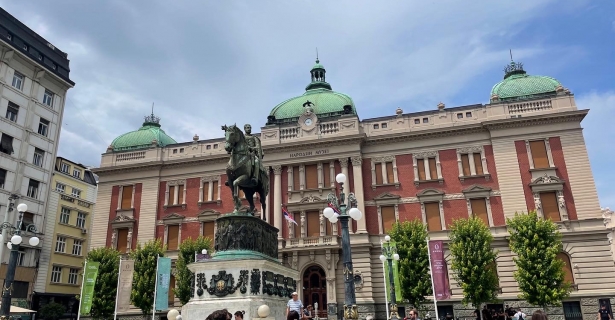I’ve been living in Belgrade for over a month now, and it has been probably one of the best experiences of my life. It took a bit to get fully adjusted to living in a new place, but now that I’ve been able to create a routine, learn a bit of the language, and travel to other places in the Balkans, I feel much more settled in. Plus, there’s a bakery with Serbian pita on every street–what’s not to love?
Working for CANVAS is fascinating, especially being in training meetings with activists. Hearing about the different ways CANVAS and these activists collaborate, and their stories from on the ground protests and actions in their countries has been an incredible learning experience, and has made me feel like the work I do is actually impactful. CANVAS is very focused on letting the activists lead their own learning and decide what they want to do with CANVAS strategies, which largely center on identifying the pillars holding up the regime and weakening them through various nonviolent tactics. Nonviolent protest movements of the kind CANVAS works on are strategic (hence the reason for the “S” in CANVAS’s acronym), meaning activists and leaders involved with the movement develop a plan to erode these pillars, while attracting more support and members for themselves. These movements are not spontaneous and do not conduct their activities spontaneously–everything is planned and executed on a certain schedule, which helps them succeed because they know how to counter repression by the regime.
A major project interns are helping with right now is a collaboration CANVAS is doing with another organization on researching democratic transitions. They are looking at cases of successful nonviolent democracy movements, and how successful, or unsuccessful, their subsequent transitions to democracy were. This has been a really interesting topic to research, especially because political transitions are an area which I was already interested in before starting with CANVAS as a result of my coursework at Tufts. Researching democratic transitions (or lack of transition) in countries like Malawi, Zambia, and Ethiopia has been a fascinating way to get practical experience learning about this topic, and knowing that my work is helping further a study on nonviolent resistance that could have real impacts for CANVAS’s work and future, as opposed to just sitting in my professor’s inbox waiting for a grade, is a great feeling.

